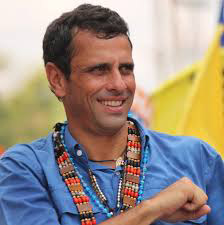CARACAS, (Reuters) – Venezuelan opposition leaders said their coalition won control of the legislature from the ruling Socialists for the first time in 16 years yesterday, though there was no confirmation from the national electoral board.

Opposition leader Henrique Capriles, prominent rights activist Lilian Tintori and another opposition leader who asked not to be identified said the Democratic Unity coalition had gained a majority in the 167-member National Assembly.
“The results are as we hoped. Venezuela has won. It’s irreversible,” tweeted Capriles, a former presidential candidate and one of the leading figures inside the coalition.
The National Electoral Council was yet to give official results, however, and there was no word from the headquarters of President Nicolas Maduro’s Socialist Party.
Several opposition sources told Reuters they believed the coalition had won around 100 seats in the legislature.
Should that be confirmed, it would be a severe setback for Venezuela’s ruling “Chavista” movement, named for Maduro’s popular predecessor Hugo Chavez who died in 2013.
It would also be a further blow to Latin America’s left following last month’s swing to the center-right in Argentina’s presidential election.
The Democratic Unity coalition appeared to have to capitalized on a wave of discontent with spiraling inflation and product shortage that many Venezuelans blame on Maduro.
“I used to be a proud Chavista,” said Rodrigo Duran, a 28-year-old security guard who switched allegiance in his vote on Sunday.
“But how can I carry on when my salary doesn’t allow me to feed my children? They deceived us.”
If its victory is confirmed, Venezuela’s opposition will have the chance to break the ruling party’s control over the budget and seek amnesty for dozens of jailed activists including hardline leader Leopoldo Lopez, the husband of Tintori.
But without a two-thirds majority – or 112 seats – they would be unable to shake up other institutions such as the courts and electoral council, widely viewed as pro-government.
Maduro’s term is due to end in 2019, but Sunday’s election could build momentum within the opposition to push for a recall referendum next year.
“We know we’ve won, we don’t know what the government is going to do,” Tintori said in a video. “More than 100 legislators, I’m so happy.”
Opposition supporters congregated at a campaign headquarters in a hotel of affluent east Caracas hugged and high-fived, though many cautioned they were still awaiting official confirmation.
Since Chavez died in 2013, Venezuela’s economy, which relies heavily on crude oil exports, has descended into crisis.
With inflation thought to be in triple digits, vast lines outside supermarkets owing to shortages of basic goods and an 80 per cent collapse of the currency on the black market, it is the economy that turned many away from the government.
“I voted because we want a change in this country. We’re bored of so many queues, food shortages, a minimum wage that doesn’t get us anywhere,” said Cristobal Jesus Medina Chacon, a 27-year-old engineer who arrived at his voting station in the western city of San Cristobal at 4 a.m.
Experts say both dysfunctional state controls and the plunge in oil prices are behind Venezuela’s economic demise.
